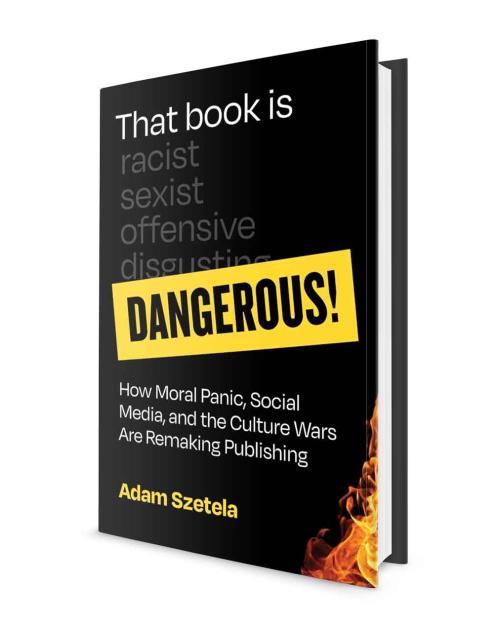As a new doctoral student at Cornell, Adam Szetela Ph.D. ’25 noticed an interesting trend in the book publishing world. Rather than criticism from people on the cultural right about the morals —or lack thereof — in current titles, authors and publishers were being slammed by folks on the cultural left, who were attacking books as racist or sexist, or questioning an author’s sensitivity.
“A lot of this is coming from a place of good faith,” Szetela said about the trend, which he writes about in “That Book Is Dangerous! How Moral Panic, Social Media, and the Culture Wars Are Remaking Publishing,” published Aug. 12 by the Massachusetts Institute of Technology Press and distributed by Penguin Random House. “But while the right is remaking the world in its image, the left is standing in a circular firing squad.”
Szetela said this new version of self-censorship is fueled by the vast reach of social media today.

“For decades, people have been concerned about the way literature created stereotypes and misrepresented cultures, with good reason,” Szetela said. “But what gives this unprecedented life now is social media. Everyone has their own platform and can draw attention to these things through hashtags.”
Followers of certain accounts can make a post attacking a book go viral “without ever reading the book,” he said. For instance, Twitter users pushed one young adult author to pull her book after accusations of racism over the depiction of slavery in her fictional world.
As he worked on his book, Szetela interviewed presidents and vice presidents of the “Big Five” publishing houses — Penguin/Random House, Hachette Book Group, Harper Collins, Simon and Schuster and Macmillan — as well as literary agents, authors, editors, marketers, sensitivity readers and other industry insiders.
Some of the trends he notes include:
- The #ownvoices campaign, which encourages authors to disclose their own identities to prove to readers that they can identify with their characters;
- The use of sensitivity readers to preview books and note possible troublesome issues;
- Moral contracts authors are asked to sign to ensure their personal behavior doesn’t tarnish the reputation of their book and/or the publisher.
Not surprisingly, when Szetela reached out, many publishing industry staff were hesitant to wade into the issue, he said. “I wasn’t writing about the NSA or the CIA, but with due justification, editors are understandably nervous about criticizing their own publishers.”
The stakes for authors and publishers of taking a risk on a possibly controversial book are economic in the short-term, but also impactful in the long-term, he said
“The dramas and accusations have high moral stakes,” Szetela said. “To be accused of racism or sexism in academia and publishing, that’s a stench that doesn’t wash off easily.”
Though changes in the industry would need to come from the top down, Szetela encouragers readers to speak up when they see this kind of attack happening. He’d also like to see changes at sites including X and Goodreads to disincentivize caustic reviews, especially coming from readers who haven’t taken the time to read the book.
Szetela’s writing has been published in The Washington Post, The Guardian and Newsweek and has been honored by the Society for Features Journalism.
His next two books focus on the large number of famous comedians who went to Ivy League universities and the trend of young men moving to the right of the political spectrum.




